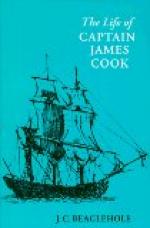Massacre.
On his next voyage Cook obtained an account of the affair from the natives, when they said that the crew was at dinner and some of the Maoris attempted to steal some bread and fish, whilst one tried to get something from the boat which had been left in charge of the Captain’s black servant. The thieves were given a thrashing, and a quarrel arose, during which two muskets were discharged and two natives were shot. The Maoris then closed in and killed all the sailors immediately. The Yorkshire Gazette of 4th June 1887 states that it was reported that a midshipman escaped the massacre, and after many wanderings reached England in 1777. If this improbable story is true he must have been Mr. Woodhouse, whose shoes were found, for he was the only midshipman in the boat.
On 23rd December the Adventure sailed, but owing to contrary winds did not get away from the coast for some days. She stood south-east till 56 degrees South was reached, and then the cold being extreme and the sea high, her course was set for the Horn, reaching as high as 61 degrees South with a favourable wind. Stores were running short, so after an unsuccessful search for Cape Circumcision she sailed for Table Bay, and having refitted, again left on 16th April for England, and dropped her anchor at Spithead on 14th July 1774.
Mr. Forster states that this second voyage of Cook cost 25,000 pounds, but does not give the source of his information.
CHAPTER 15. 1775 TO 1776. ENGLAND.
After his return Cook was busily engaged preparing his Journal and charts for publication, which had been sanctioned by the Admiralty, and was considerably annoyed and delayed by the conduct of Mr. Forster, who immediately on his return complained that the 4,000 pounds granted him to cover the whole of his expenses had proved totally inadequate. He claimed that Lord Sandwich had promised, verbally, that he was to have the exclusive duty of writing the History of the Voyage, was to receive the whole of the profits thereof, and to be provided with permanent employment for the remainder of his life. This promise was totally denied by Lord Sandwich, and it certainly does not appear to have been a reasonable one to make on behalf of the Admiralty.
After a protracted discussion, it was agreed that Cook should write the account of the voyage and the countries visited; whilst Forster was to write a second volume containing his observations as a scientist; the Admiralty was to pay the expenses of engraving the charts, pictures, etc., and, on completion of the work, the plates were to be equally divided between Cook and Forster. Cook was to proceed with his part at once and submit it to Forster for revision, and Forster was to draw up a plan of the method he intended to pursue and forward it to Lord Sandwich for approval.
Cook proceeded to carry out his share, and furnished Forster with a large amount of manuscript; but the latter proved obstinately insistent in having his own way in everything, with the result that, after submitting two schemes to Lord Sandwich, both extremely unsatisfactory, he was forbidden to write at all, and it was decided that Cook should complete the whole work, and it should be revised by the Reverend John Douglas, Canon of Windsor, afterwards Bishop of Carlisle.




